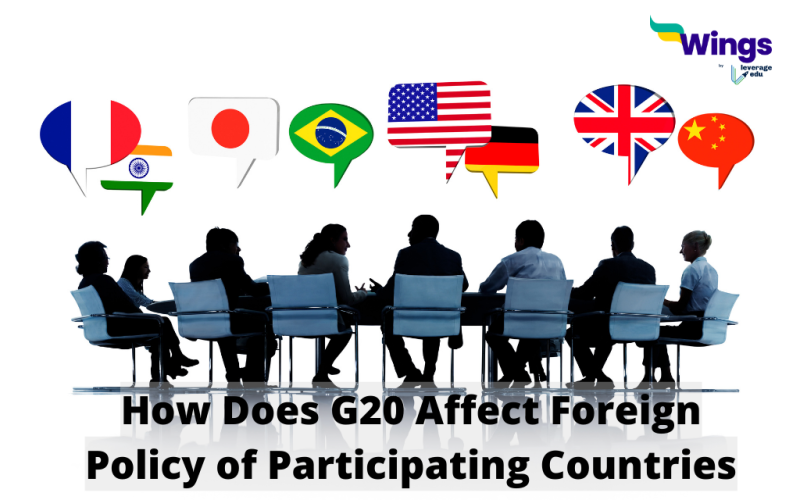G20 is the prominent platform for economic cooperation between nations. The forum has a significant impact on the development of global governance for all of the world’s most pressing economic concerns. Before, the G20 mostly dealt with broad macroeconomic issues, but now it also addresses trade, sustainable development, health, agriculture, energy, the environment, climate change, and anti-corruption. Read this article to know how G20 affect the foreign policy of participating countries.
This Blog Includes:
What is the Purpose of the G20 Meet?
The G20 focuses mainly on economic matters, but its summits also provide a forum for member countries to discuss and collaborate on international issues. The G20 nations have substantial political and economic sway over the world, and their decisions could have a big effect on world events.
How Does G20 Affect the Foreign Policy of Participating Countries?
The Participating countries in the G20 can use the forum to advance their foreign policy interests by building alliances, shaping the global agenda, and coordinating their actions with other major economies. For example, in the aftermath of the global financial crisis, the G20 played a critical role in coordinating the international response to the crisis, including through financial assistance to vulnerable economies and regulatory reforms to prevent future crises. Moreover, participating countries can leverage the G20 to promote their foreign policy priorities on issues such as climate change, terrorism, trade, and regional conflicts.
In summary, the G20 can affect the foreign policy of participating countries by providing a platform for coordination, collaboration, and influencing global agendas on issues related to international economic and financial policies, as well as broader foreign policy matters.
Also Read: Y20 Theme and Major Events: G20 2023 Summit
How Does the Power Dynamic of the G20 Influence the Foreign Policy of Participating Nations?
Economically and politically, developed countries like the United States, the European Union, and Japan dominate the G20 more than developing nations like India, Indonesia, and South Africa. This might give them a greater say in shaping foreign policy and strategy.
For instance, at the G20 Summit in Hamburg in 2017, the United States, under the leadership of President Donald Trump, rejected the inclusion of language on climate change in the final communiqué. Despite knowing that the other members of the G20 had unanimously backed the Paris Agreement, the US refused to sign.
This decision by the United States had a significant impact on the foreign policy priorities of other G20 members. For example, Germany, the host country of the G20 Summit, has made combating climate change a top international priority. However, the failure to include language on climate change in the final communiqué was seen as a defeat for Germany and other countries that were committed to solving this global crisis.
In this way, foreign policies, especially those pertaining to issues of interest to developing countries, can be significantly influenced by the power imbalance within the G20. Decisions may be made that favour the most powerful countries rather than the G20 as a whole or the international community.
What Effects Does it Have on the Foreign Policies of the Countries Participating?
Absolutely, the host nation of the G20 Presidency has a greater say in setting the agenda and policies of the Summit. It has the opportunity to set the tone of the discussion toward issues of particular concern.
For example, in 2018, Argentina hosted the G20 Summit in Buenos Aires. As the host country, Argentina was able to prioritize issues that were important to its own foreign policy agenda. One of the key issues that Argentina highlighted during the summit was the need for greater infrastructure investment in Latin America.
In view of the global rise in protectionism and trade tensions, Argentina also used the G20 forum to debate trade issues. Concerned about the effects on its own economy, Argentina used the G20 to push for a more open and rules-based international trading system, given its position as a major agricultural exporter.
Although the host country may have some sway, the G20 is a consensus-based process in which all member countries have an equal say in the outcomes. However, the host nation’s sway might affect the foreign policies of the other countries involved.
When it comes to the world’s most pressing economic concerns, the G20 has been instrumental in establishing and strengthening global architecture and governance. All the Member nations work together to achieve the forum’s common objective. Despite the G20’s shared goals and policies, the organization’s internal dynamics are impacted by a number of external events that have an impact on the member states. Because of these differences, one nation is better positioned than another to benefit from and contribute to the organization.
Consequently, the policy framework of countries within the organization is affected including foreign policy. Sometimes for its own best interests, and at other times because of stronger countries.
For more such updates about the G20 and Y20 Summit stay tuned to our page. And don’t forget to follow us on Instagram, Facebook, Twitter, and Linkedin.


 One app for all your study abroad needs
One app for all your study abroad needs












 60,000+ students trusted us with their dreams. Take the first step today!
60,000+ students trusted us with their dreams. Take the first step today!